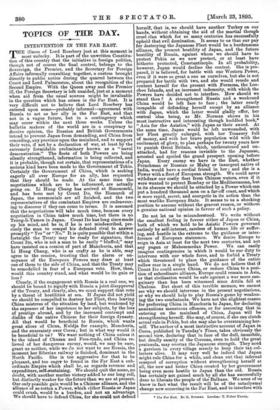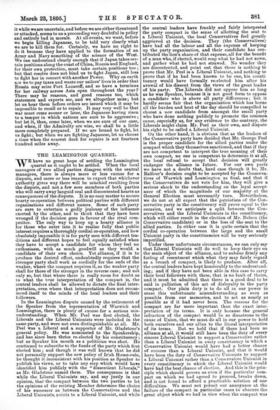TOPICS OF THE DAY.
INTERVENTION IN THE FAR EAST. THE illness of Lord Rosebery just at this moment is most unlucky. It is part of the unwritten Constitu- tion of this country that the initiative in foreign politics, though not of course the final control, belongs to the Sovereign, the Premier, and the Secretary for Foreign Affairs informally consulting together, a custom brought directly to public notice during the quarrel between the Court and Lord Palmerston, about the recognition of the Second Empire. With the Queen away and the Premier ill, the Foreign Secretary is left unaided, just at a moment when aid from the usual sources might be invaluable in the question which has arisen in the Far East. It is very difficult not to believe that Lord Rosebery has entered upon some—probably informal—agreement with Russia to act as her ally in the Far East, and that not in a vague future, but in a contingency which may occur within the next three weeks. Unless the bulletin makers of the world are in a conspiracy to deceive opinion, the Russian and British Governments intend to prevent Japan from demanding, and China from conceding, any province upon the mainland, and to support their veto, if not by a declaration of war, at least by the extremely formidable preliminary known as a "naval demonstration." The fleets of both Powers are being silently strengthened, information is being collected, and it is probable, though not certain, that representations of a serious kind have been made to the Government of Tokio. Certainly the Government of China, which is seeking eagerly all over Europe for an ally, has requested that they should be made. At the same time the negotiations which are to be influenced, are actually going on. Li Hung Chang has arrived at Simonoseki, and has been met by Count Ito, the Bismarck of Japan, the ceremonials are all finished, and the two representatives of the combatant Empires are endeavour- ing to discover if they can come to terms. It is assumed that the negotiations will take much time, because every negotiation in China takes much time, but there is no Tsung-li-Yamen in Japan. Count Ito has long since made up his mind, and he is, if he is not misdescribed, pre- cisely the man to compel his defeated rival to answer promptly " Yes" or "No." It is quite possible that within a fortnight the Treaty may be ready for signature, that Count Ito, who is not a man to be easily "bluffed," may have insisted on a cession of part of Manchuria, and that Li Hung Chang, who is as crafty as he is able, may agree to the cession, trusting that the alarm or an- noyance of the European Powers may draw at least one of them to the side of China, and that the Treaty may be remodelled in fear of a European veto. How, then, would this country stand, and what would be its gain or loss ?
Clearly, if the engagement with Russia is a real one, we should be bound to signify with Russia a joint disapproval of the Treaty, and clearly, also, we must support that veto by a threat of hostilities at sea. If Japan did not yield we should be compelled to destroy her Fleet, thus leaving China mistress of the situation by land, but weakened by the exposure of her impotence to her subjects, by the loss of prestige abroad, and by the increased contempt and dislike of the native Chinese for their foreign dynasty. All that would be beneficial to Russia, which wants great slices of China, Kuldja for example, Manchuria, and the suzerainty over Corea ; but in what way would it be beneficial to us ? We want nothing of China unless it be the island of Chusan and Free-trade, and China re- lieved of her dangerous enemy, would, we may be sure, grant us neither, while we do not want to see Russia, the moment her Siberian railway is finished, dominant in the North Pacific. She is too aggressive for that to be pleasant, and too eager to found in the Far East a sub- ordinate Empire which shall be, as regards revenue and expenditure, self-sustaining. We should quit the scene, no doubt, with another marine victory added to our long roll, but distinctly weaker for the future than we are at present. Our only possible gain would be a Chinese alliance, and the alliance of so rotten a Power, which either Russia or Japan could crush, would be a burden, and not an advantage. We should have to defend China, for she could not defend herself, that is, we should have another Turkey on our hands, without obtaining the aid of the martial though cruel clan which for so many centuries has successfully upheld that evil domination. It seems to us that our pay for destroying the Japanese Fleet would be a burdensome alliance, the present hostility of Japan, and the future hostility of Russia, against whom we should have to. protect Pekin as we now protect, or at least have hitherto protected, Constantinople. In all probability, however, Japan would decline the contest. She is pre- pared, it is believed, for battle with one Western Power, even if it were so great a one as ourselves, but she is not prepared for battle with two, and she would recede and content herself for the present with Formosa, the Loo- choo Islands, and an increased indemnity, with which the Powers have decided not to interfere. How should we stand then ? A strengthened Russia and a weakened China would be left face to face ; the latter nearly incapable of defending herself except by an affiance with Japan, which the latter would gladly offer, her central idea being, as Mr. Norman shows in his most instructive and interesting though huddled book,* "Asia for the Asiatics," with Japan as their sword. At the same time, Japan would be left unwounded, with her Fleet greatly enlarged, with her Treasury full of money, and with her brave population wild with the excitement of glory, to plan perhaps for twenty years how to punish Great Britain, which, unthreatened and un- attacked, had for reasons invisible to the Japanese, arrested and spoiled the grand prospect opening before Japan. Every enemy we have in the East, whether Frenchman or Russian or Malay or insurgent native of India, would have a cordial friend in her ; and she is a Power with a fleet of European strength. We could never withdraw our costly fleet from Chinese waters, even if it were wanted to protect Bombay or the Mediterranean, lest in its absence we should be attacked by a Power which can put a hundred thousand men on a far-off coast, and which is more rapid, secret, and energetic in its action than the most warlike European State. It seems to us a shocking position to assume without the gravest reason, or without a genuine national opinion in favour of such a policy.
Do not let us be misunderstood. We write without the smallest feeling in favour either of Japan or China, both of which we hold to be Asiatic Powers governed entirely by self-interest, careless of human life or suffer- ing, and hostile in the extreme to the guidance or inter- ference of European statesmen. We desire Europe to reign in Asia at least for the next two centuries, and not any pagan or Mahommedan Power. We can easily imagine contingencies in which it would be our duty to intervene with our whole force, and to forbid a Treaty which threatened to place the guidance of the entire yellow race in a single hand. We do not believe that ii Count Ito could annex China, or reduce China to a posi- tion of subordinate alliance, Europe could remain in Asia, or that civilisation would be safe against a war more san- guinary than has been witnessed since Attila fell at Chalons. But short of this terrible menace, we cannot see why we should intervene in the present negotiations, or why we should help to play Russia's game by weaken- ing the two combatants. We have not the slightest reason for preferring China in Manchuria to Japan, for declaring annexations monstrous offences, or for assuming that in entering on the mainland of China, Japan will be strengthening herself. She may, of course, if she can clutch actual rule in Pekin, but she may also be overstraining her- self. The author of a most instructive account of Japan in Corea, published in Tuesday's Times, takes obviously the second view, declaring that in face of the dull, immobile, but deadly enmity of the Coreans, even to hold the great peninsula, may overtax the Japanese strength. They need a garrison in every village merely to keep their tax-col- lectors alive. It may very well be indeed that Japan might rule China for a while, and clean out that infernal cesspool of corruption without strengthening herself at all, the new and better China created by her government being even more hostile to Japan than the old. Russia has certainly not gained much by all she has successfully done to liberate the people of the Balkans. We none of us know in fact what the result will be of the cataclysmal change now occurring in the Far East, and to interfere with • The Far Ease. By II, Norman. London: T. Fisher trnwin. it while we are uncertain, and before we are either threatened or attacked, seems to us a proceeding very doubtful in policy and entirely bad in morals. At all events, we want, before we begin billing Japanese, to be told very clearly what we are to kill them for. Certainly, we have no right to do it because they have applied to the formation of an Army and Navy something of the science of the Weat. We can understand clearly enough that if Japan takes cer- tain positions along the coast of China, Russia and England, for their own protection, must take certain positions too ; but that resolve does not bind us to fight Japan, still less to fight her in concert with another Power. Why on earth are we to pay taxes and waste our sailors' lives in order that Russia may seize Port Lazareff, and. so have a terminus for her railway across Asia open throughout the year ? There may be reasons, and good reasons too, which statesmen and experts see, and we altogether miss ; but let us hear them before orders are issued which it may be impossible to recall or to repair. It may very well be that war must come sooner or later, the Japanese having risen to a temper in which nations are sure to be aggressive ; but let it, then, come later, when we are sure of our case, and when, if the Admiralty are wise, we shall be a little more completely prepared. If we are bound to fight, let us fight; but when we are fighting Japanese, let us choose a time when the nearest dock for repairs is not fourteen hundred miles away.







































 Previous page
Previous page